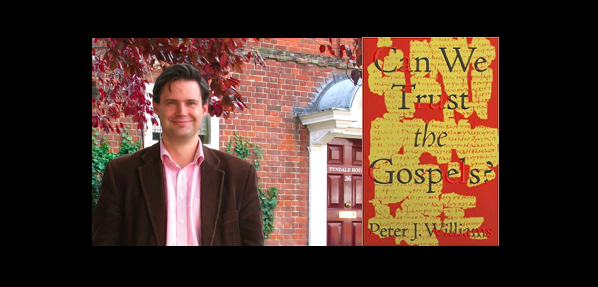Can We Trust the Gospels? Interview with Author Peter Williams.
SeanMcDowell.org
Peter J. Williams is on the Faculty of Divinity at Cambridge University. He has written an excellent new book called Can We Trust the Gospels? John Lennox calls the book “a masterly presentation of a cumulative case” for Jesus. It is written for skeptics, believers, and scholars. The book officially releases November 30, but you can pre-order it now.
Dr. Williams was kind enough to answer a few of my questions about the evidence for the Gospels and his new book. Enjoy!
SEAN MCDOWELL: You have a book coming out soon called Can We Trust the Gospels? What motivated you to write it?
PETER WILLIAMS: I’ve been speaking about the subject for over 20 years and tested the content on many audiences in various countries. People kept asking me when I was going to write it down, but I’ve been busy and also felt that the material improved every time I got feedback. So, I delayed writing it down till now, when I think it’s time.
MCDOWELL: What makes your book unique compared to other books defending the reliability of the Gospels?
WILLIAMS: There are lots of great books on the subject. My book is aimed at a thinking audience which may know absolutely nothing about the Gospels. I’ve therefore tried not to take knowledge for granted, but also haven’t introduced any scholarship into the book merely for its own sake. I wanted to stick to the bare essentials of how we reasonably know what we know.
How do we know that the Gospels are at all ancient? How do we know that ancient literature has been correctly handed down? How do we know anything about who the Gospel writers were?
I’ve tried to give reference to primary sources so that people can check things directly and to appeal to scholarly authority as little as possible.
I think the book is unusually brief, not taking things for granted, and yet having references transparent for everyone to check. My ideal audience for this would be non-Christians or those beginning in the faith, but also I think I’ve got things in there which people who have read other apologetics books won’t have seen. For instance, I think my way of defending the integrity of the text of the Gospels by appealing to Erasmus’s Paraphrases will not be found elsewhere.
MCDOWELL: What do you consider the strongest point (or two) in favor of the trustworthiness of the Gospels?
WILLIAMS: It’s really hard to choose. It’s a bit like if someone asks me what are the strongest one or two points which make me believe that my wife is trustworthy! Trustworthiness in a writing or in a person is actually something which permeates everything.
Speaking personally, my experience with writing the book also supports the trustworthiness of the Gospels. If I had to invent arguments for the trustworthiness of something or someone which was not trustworthy, I would expect the process to be difficult and to feel artificial. But I didn’t feel this at all. Arguments came naturally. If I investigated how familiar the writers were with the geography of the land of Israel, positive answers came easily. If I asked about any other aspect of local knowledge, it seemed to come easily. It’s like if someone asked me to prove my familiarity with my home town (Cambridge, UK). It wouldn’t be hard.
MCDOWELL: How has the evidence for the Gospels changed over the past few years?
WILLIAMS: In some ways it changes very little. Most of the arguments I use could have been articulated centuries ago, and some have been. Of course, in the areas of archaeology and manuscripts, new discoveries are constantly being made, but these tend not to overturn previous knowledge, so much as to refine it. There are still plenty of arguments for the truth of the Gospels which may never have been written down.
MCDOWELL: Why is it important that Christians be able to defend the Gospels? In other words, who cares?
WILLIAMS: I think it’s important to remember that the narrative about Jesus is not just a nice story but is reality. Although apologetics do not play a major role in most conversions, for some types of people, it is absolutely essential for them to know that they’re not just following feelings when they become Christians. They need to know that the basis of the Christian faith is historically true.
There are also a lot of non-Christians who really care that the Gospels should not be true. The claim that Jesus, his miracles and his resurrection are part of the real world deeply challenges the idea that humans can govern themselves according to their own desires.
If we Christians aren’t able to articulate why Christianity is about the real world then Christianity will seem to many like a subjective crutch, irrelevant to real life.

